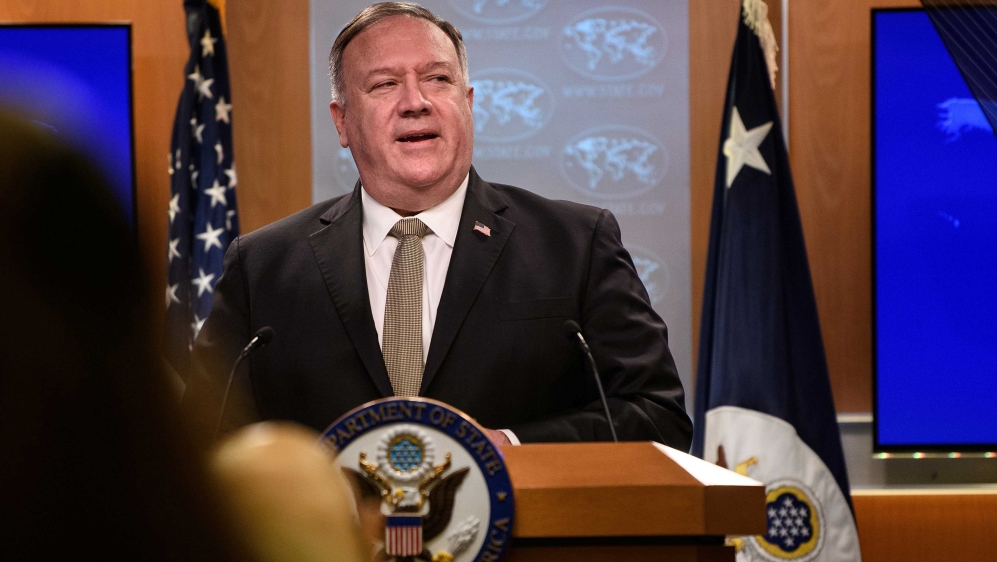International Criminal Court condemns US sanctions on officials
US sanctions target International Criminal Court prosecutor Fatou Bensouda and a top aide over Afghanistan probe.

The International Criminal Court (ICC) has condemned “unprecedented” sanctions imposed by the United States on prosecutor Fatou Bensouda and one of her top aides in retaliation for a probe into alleged war crimes in Afghanistan.
The Hague-based tribunal said the sanctions announced by US Secretary of State Mike Pompeo against Bensouda and another senior official, Phakiso Mochochoko, were “serious attacks” against the rule of law.
Keep reading
list of 4 itemsCan international justice stop Israel?
What will be the outcome of the ICJ genocide case against Israel?
Is Israel committing genocide in Gaza?
Pompeo announced the moves on Wednesday, saying that “the ICC continues to target Americans”.
The ICC said in a statement the new measures “are another attempt to interfere with the Court’s judicial and prosecutorial independence and crucial work to address grave crimes of concern to the international community”.
The sanctions include a freeze on assets held in the US or subject to US law and target Bensouda and the court’s head of jurisdiction, Mochochoko.
Pompeo also said individuals and entities that continue to materially support Bensouda and Mochochoko would risk exposure to sanctions as well.
“We will not tolerate its illegitimate attempts to subject Americans to its jurisdiction,” Pompeo said.
|
|
The war crimes court said it “continues to stand firmly by its personnel and its mission of fighting impunity for the world’s most serious crimes”.
The ICC will continue its investigation into possible war crimes by the United States and its allies in Afghanistan.
The State Department also restricted the issuance of visas for individuals Pompeo said were involved in the court’s efforts to investigate US personnel, though he did not name those affected.
Member countries of the International Criminal Court hit out against the “unacceptable” sanctions.
“I strongly reject such unprecedented and unacceptable measures against a treaty-based international organisation,” said O-Gon Kwon, president of the ICC’s Assembly of States Parties.

UN Secretary-General Antonio Guterres was concerned by Pompeo’s announcement, UN spokesman Stephane Dujarric told reporters.
Dujarric said that “we trust that any restriction taken against individuals will be implemented consistently” with a decades-old US deal with the United Nations to host the world body’s headquarters in New York.
The European Union promised on Thursday to defend the ICC while British Prime Minister Boris Johnson said the United Kingdom regretted the US move.
“The International Criminal Court is facing persistent external challenges and the European Union stands firm against all attempts to undermine the international system of criminal justice by hindering the work of its core institutions,” Peter Stano, spokesman for EU diplomatic chief Josep Borrell, told reporters.
“We are committed to strengthen our suport to the ICC because this is key factor in fighting against impunity. We are standing by the ICC and we are not happy to see steps which are going against the activities of the ICC.”
‘Stunning perversion’
Bensouda was given the go-ahead by the court in March to investigate whether war crimes were committed in Afghanistan by the Taliban, Afghan military and US forces.
The US revoked Bensouda’s entry visa last year in response to the possible Afghanistan inquiry. But under an agreement between the UN and Washington, she was still able to regularly travel to New York to brief the UN Security Council on cases it had referred to the court in The Hague.
What doe these people have in common?
Myanmar generals accused of atrocities
Saudi officials linked to Jamal Khashoggi's murder
President Assad for mass abuses in Syria
ICC prosecutors investigating war crimesThe Trump administration has imposed sanctions on all of them. pic.twitter.com/Xdb0Za9U63
— Human Rights Watch (@hrw) September 2, 2020
Rights groups immediately condemned the US designations.
Richard Dicker, Human Rights Watch international justice director, said it was a “stunning perversion of US sanctions.”
“The Trump administration has twisted these sanctions to obstruct justice, not only for certain war crimes victims, but for atrocity victims anywhere looking to the International Criminal Court for justice,” he said.